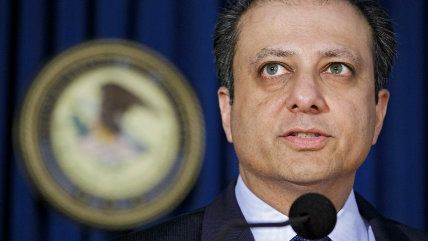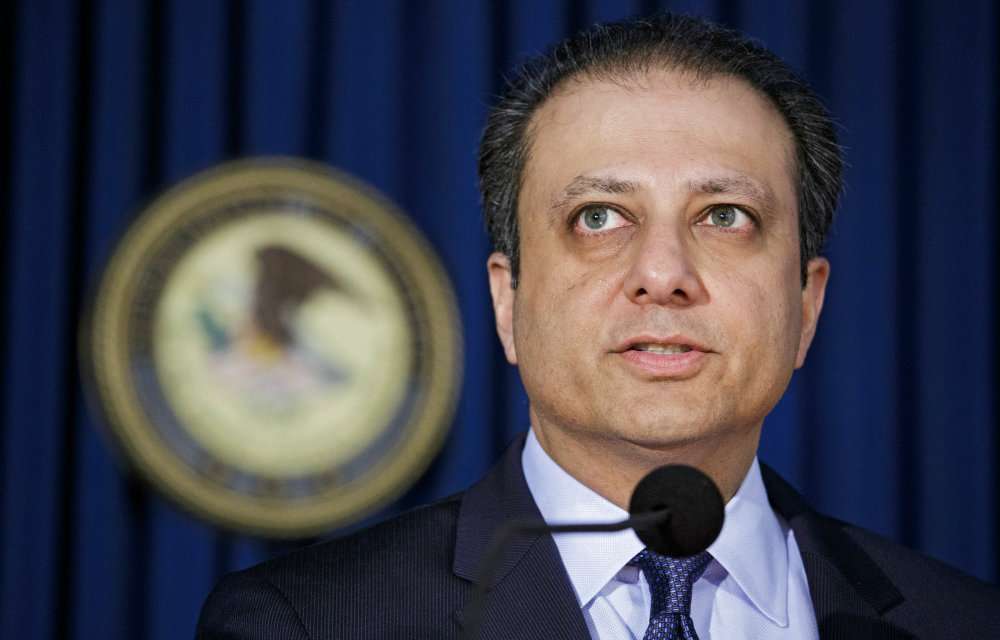What's Next for Preet Bharara?
Bharara's views on policy are a mystery. If he is to be a success as a politician he'll need to figure that stuff out.


What should Preet Bharara do next?
Life, especially public life, is full of second acts. A previous U.S. attorney for the Southern District of New York who was unpopular in certain circles for overreaching in white-collar criminal cases against Wall Street, Rudolph Giuliani, turned out to be a pretty successful mayor of New York.
In that spirit, here are some possible future career options for Bharara, who was fired on Saturday after he refused a request to resign.
The most common path would be to the private sector. Among Bharara's predecessors as the top federal prosecutor in Manhattan, Mary Jo White went to Debevoise & Plimpton, while Giuliani went, initially, to White & Case. Michael J. Garcia went to Kirkland & Ellis.
These days, lawyers can sometimes make more money by avoiding big law firms and going to work instead directly for hedge funds. That was the path taken by another recent U.S. attorney for the Southern District of New York, James Comey, who went to work for Bridgewater Associates. He later was named to lead the FBI. Bharara's former deputy at the Southern District, Richard Zabel, went to work for Elliott Management Corp.
Law firms and hedge funds both pay more than government work. Work for private clients might have the additional benefit of providing Bharara with some useful perspective that he had lacked about what it feels like to be on the receiving end of prosecutorial inquiries. On the other hand, Bharara's financial needs appear to be less acute than those of some of his predecessors; he reportedly made $1 million as an investor in his brother's online diaper company, which was sold to Amazon.com. (The irony of an "insider trading" prosecutor profiting handsomely from a legal private investment in a family member's company is a topic for another column.)
Bharara could try collecting unemployment benefits. Insisting on being "fired" rather than resigning voluntarily at the president's request makes it easier to collect such benefits. Eventually, though, those benefits run out, and Bharara will need to find some way to keep himself busy.
Bharara could follow in the footsteps of another predecessor at the Southern District, Robert Morgenthau, and run for governor of New York. Morgenthau, however, lost that race. A prosecutor-type personality who did succeed in reaching the governor's office, Eliot Spitzer, resigned in disgrace. Bharara as a politician might be an improvement; it is electoral and legislative politics, rather than criminal justice, that arguably is a better forum for achieving his political goal of "cleaning up" Albany.
Bharara's views on the policy substance—jobs, growth, inequality, poverty, redistribution, transportation, education—are for the most part a mystery. If Bharara is to be a success as a politician or a governor he'll need to figure that stuff out. Simply focusing on process or good-government reforms designed to curb corruption or influence peddling will be insufficient.
There are other alternatives. Bharara—still championed by his former boss in the U.S. Senate, Charles Schumer—could seek a federal judgeship as some sort of compromise deal in which Schumer would in turn deliver Democratic assent to the confirmation of some Republican judges. The Harvard Law School deanship is available, or some other suitable academic perch could be found; Richard Zabel teaches at Columbia Law School in addition to his work at Elliott.
Initially, my hope was that President Trump might find some part of the federal government in which Bharara's investigative zeal, unfettered in too many cases by the traditional restraints, might actually be an asset rather than a liability. Maybe he could be in charge of tracking Iran's cheating on the nuclear deal, or of shutting down access by the Islamic State to the international oil markets. Perhaps he could be put in charge of rooting out fraud and abuse in Medicaid, food stamps, or other welfare programs. Maybe he could investigate North Korea's human rights abuses or its nuclear program.
The more I thought of it, though, the more I realized that there just aren't many positions in the federal government where an approach of the sort Bharara has become known for would be a virtue. The risks of innocent people being wrongly ensnared are too great. It's a rare distinction. Of how many government lawyers can it be said, upon their departure from public service, that you wouldn't wish them on even your worst enemies?
A really successful second act for Preet Bharara would be one in which he restored his reputation. For expertise on that, the prosecutor might want to consider seeking out some of his former targets.


Show Comments (49)